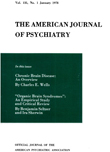Implications of the Women's Liberation Movement for Psychotherapy
Abstract
The authors examine the implications of the women's liberation movement for current psychotherapeutic theory and practice in terms of the antifeminine Freudian position, the predominance of male therapists, the concept of role unhappiness as psychopathological, and the threat to the therapist's social power. Consideration of role conflict in sociological terms instead of the intrapsychic rubric is especially emphasized. The authors also discuss related issues concerning the training of therapists and propose a model using male and female cotherapists.
Access content
To read the fulltext, please use one of the options below to sign in or purchase access.- Personal login
- Institutional Login
- Sign in via OpenAthens
- Register for access
-
Please login/register if you wish to pair your device and check access availability.
Not a subscriber?
PsychiatryOnline subscription options offer access to the DSM-5 library, books, journals, CME, and patient resources. This all-in-one virtual library provides psychiatrists and mental health professionals with key resources for diagnosis, treatment, research, and professional development.
Need more help? PsychiatryOnline Customer Service may be reached by emailing [email protected] or by calling 800-368-5777 (in the U.S.) or 703-907-7322 (outside the U.S.).



